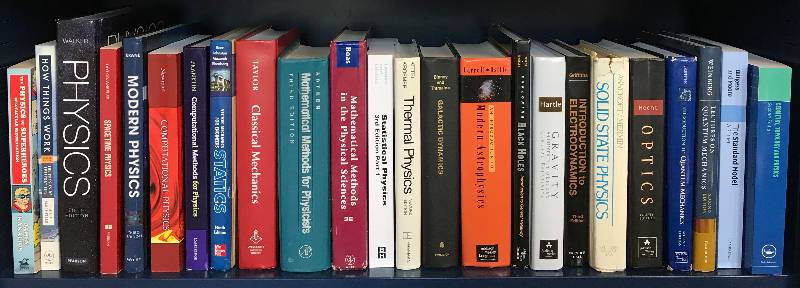This course provides an introduction to the science of climate change. Core topics
include albedo, the greenhouse effect, the carbon cycle, and feedback mechanisms between
these phenomena. Students will study past climates, climate models, and the impacts
of modern climate change. Near the end of the semester students will discuss efforts
to mitigate climate change. They conclude by briefly discussing the most widely adopted
climate change policies. No previous experience with these subjects is assumed.
Gen Ed Attribute: Science Distributive Requirement.
SCI 100-02 Dr. Sawyer
An exploration of the physics of electrical circuits, the chemical basis of electricity
as the flow of electrons, acid-base and oxidation-reduction reactions in chemical
and in chemical and in living systems, the electrical activity in the human nervous
system, and connections between electricity and sensation and locomotion in humans.
Pre / Co requisites: Education majors only.
Dr. Hoang
This class will be geared towards how physics shows up in art and music. Students
will initially study what will seem like basic physics: force and motion, electric
and magnetic fields, periodic oscillations, and wave properties. They will then begin
to focus on light, optics and color, and the human eye. Next, they will focus on sound,
sound production, sound perception, and the organization of sound into musical scales
such that "music" can be constructed.
Gen Ed Attribute: Science Distributive Requirement.
Dr. Mitchell
This survey course introduces students to the major concepts and techniques of nanoscience
through lectures and demonstrations. This survey is intended to be phenomenological
and conceptual, setting the stage for the exploration of experimental nanoscience.
Students will be introduced to why nanoscale objects are different, how to make them,
how to characterize them, and how to visualize them.
Dr. Mitchell
A study of motion, energy, light, and some aspects of modern physics.
Gen Ed Attribute: (SD) Science Distributive Requirement.
An exploration of food and cooking from a physical science perspective. Principles
of soft matter physics (e.g. phase diagram, intermolecular forces, viscosity, diffusion,
self-assembly, polymer physics) are discussed and used to gain insight into food and
cooking.
Gen Ed Attribute: Science Distributive Requirement.
PHY 123-01 Dr. Aptowicz Syllabus
PHY 123-02 Dr. Aptowicz Syllabus
An introductory, non-calculus, physics course. Mechanics of solids and fluids, wave
motion, heat and temperature, thermodynamics, and kinetic theory.
Gen Ed Attribute: (SD) Science Distributive Requirement.
An extension of PHY 130. Electricity and magnetism, geometrical and physical optics,
and modern physics.
Pre / Co requisites: PHY 140 requires prerequisite of PHY 130.
An introductory calculus-based physics course. Includes mechanics, kinetic theory,
waves, heat, and thermodynamics. The laboratory emphasizes error analysis, the writing
of technical reports, and data analysis using computers.
Pre / Co requisites: PHY 170 requires a prerequisite of MAT 161.
Gen Ed Attribute: (SD) Science Distributive Requirement.
Dr. Kandalam Syllabus
A continuation of PHY 170. Includes electricity and magnetism, geometrical and physical
optics, electronics, and modern physics.
Pre / Co requisites: PHY 180 requires prerequisite of PHY 170 and co-requisite of MAT 162.
Gen Ed Attribute: (SD) Science Distributive Requirement.
This course draws on concepts and tools from physics, biology, and chemistry to understand
how energy is transformed into order in living systems. This will require students
to consider the roles evolution, polymer physics, and chemistry have played in shaping
the machinery of life. This course is aimed at students from physics, biology, and
chemistry who are interested in stretching themselves beyond disciplinary boundaries.
Dr. Pfeil Syllabus
An atomic view of electricity and radiation, atomic theory, special relativity theory,
X-rays, radioactivity, nuclear fission, and introductory quantum mechanics.
Pre / Co requisites: PHY 240 requires prerequisites of PHY 140 or PHY 180 and MAT
162.
Dr. Waite Syllabus
This course is designed to strengthen students' understanding of measurement and uncertainty
in the laboratory setting as well as how to present data in a manner consistent with
(i) the standards and conventions of the scientific community and (ii) the concepts
of transparency, reproducibility, and credibility.
Dr. Sudol Syllabus
This is an introductory course on the basic ideas and programming skills of computational
physics, with a six-week introduction to programming given at the beginning of the
course. Students will develop their own computer software to solve problems in mechanics,
electrostatics, magnetism, quantum mechanics, chaos and other areas.
Pre / Co requisites: PHY 275 requires prerequisites of MAT 162 and PHY 170 and corequisite
courses of MAT 261 and PHY 180.
Dr. Chen Syllabus
Emphasis is divided between theory and experiment. The course begins with a brief
review of resistive and RC voltage dividers. Electronic circuits studied include basic
operational amplifiers, timers, instrumentation amplifiers, logic circuits, flip flops,
counters, and timers.
Pre / Co requisites: PHY 330 requires prerequisites of MAT 161 and PHY 140 or PHY
180.
Dr. Thornton Syllabus
Equations of state, first and second laws of thermodynamics, ideal and real gases,
entropy, and statistical mechanics.
Pre / Co requisites: PHY 350 requires prerequisites of PHY 240 and MAT 261.
Dr. Pfeil Syllabus
An advanced physics course that deals with a broad range of topics in modern astrophysics.
Topics include, but are not limited to, astronomical measurements, celestial mechanics,
radiative transfer theory, stellar structure, and both newtonian and relativistic
cosmology.
Dr. Sudol Syllabus
This course is a continuation of PHY 310, a lecture and laboratory course designed
to familiarize students with modern physics laboratory equipment and practices through
a series of experiments. Students write three research papers and give one research
talk describing the experiments and their results in a style consistent with scientific
conventions.
Pre / Co requisites: PHY 455 requires a prerequisite of PHY 320.
Gen Ed Attribute: (W) Writing Emphasis.
Dr. Mitchell

